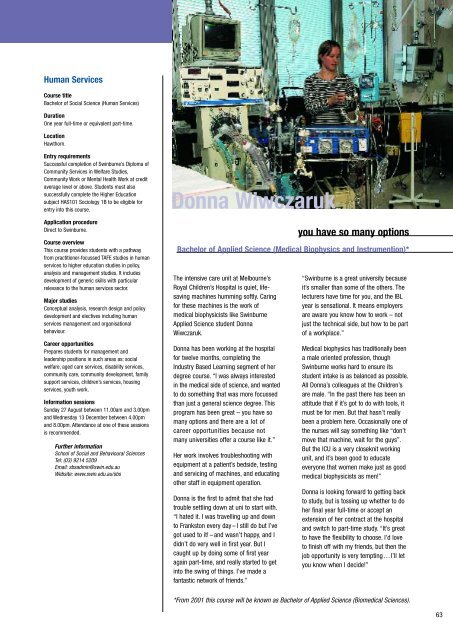2001 Swinburne Undergraduate and TAFE Course Guide
2001 Swinburne Undergraduate and TAFE Course Guide
2001 Swinburne Undergraduate and TAFE Course Guide
Create successful ePaper yourself
Turn your PDF publications into a flip-book with our unique Google optimized e-Paper software.
Human Services<br />
<strong>Course</strong> title<br />
Bachelor of Social Science (Human Services)<br />
Duration<br />
One year full-time or equivalent part-time.<br />
Location<br />
Hawthorn.<br />
Entry requirements<br />
Successful completion of <strong>Swinburne</strong>’s Diploma of<br />
Community Services in Welfare Studies,<br />
Community Work or Mental Health Work at credit<br />
average level or above. Students must also<br />
successfully complete the Higher Education<br />
subject HAS101 Sociology 1B to be eligible for<br />
entry into this course.<br />
Application procedure<br />
Direct to <strong>Swinburne</strong>.<br />
<strong>Course</strong> overview<br />
This course provides students with a pathway<br />
from practitioner-focussed <strong>TAFE</strong> studies in human<br />
services to higher education studies in policy,<br />
analysis <strong>and</strong> management studies. It includes<br />
development of generic skills with particular<br />
relevance to the human services sector.<br />
Major studies<br />
Conceptual analysis, research design <strong>and</strong> policy<br />
development <strong>and</strong> electives including human<br />
services management <strong>and</strong> organisational<br />
behaviour.<br />
Career opportunities<br />
Prepares students for management <strong>and</strong><br />
leadership positions in such areas as: social<br />
welfare, aged care services, disability services,<br />
community care, community development, family<br />
support services, children’s services, housing<br />
services, youth work.<br />
Information sessions<br />
Sunday 27 August between 11.00am <strong>and</strong> 3.00pm<br />
<strong>and</strong> Wednesday 13 December between 4.00pm<br />
<strong>and</strong> 8.00pm. Attendance at one of these sessions<br />
is recommended.<br />
Further information<br />
School of Social <strong>and</strong> Behavioural Sciences<br />
Tel: (03) 9214 5209<br />
Email: sbsadmin@swin.edu.au<br />
Website: www.swin.edu.au/sbs<br />
Donna Wiwczaruk<br />
The intensive care unit at Melbourne’s<br />
Royal Children’s Hospital is quiet, lifesaving<br />
machines humming softly. Caring<br />
for these machines is the work of<br />
medical biophysicists like <strong>Swinburne</strong><br />
Applied Science student Donna<br />
Wiwczaruk.<br />
Donna has been working at the hospital<br />
for twelve months, completing the<br />
Industry Based Learning segment of her<br />
degree course. “I was always interested<br />
in the medical side of science, <strong>and</strong> wanted<br />
to do something that was more focussed<br />
than just a general science degree. This<br />
program has been great – you have so<br />
many options <strong>and</strong> there are a lot of<br />
career opportunities because not<br />
many universities offer a course like it.”<br />
Her work involves troubleshooting with<br />
equipment at a patient’s bedside, testing<br />
<strong>and</strong> servicing of machines, <strong>and</strong> educating<br />
other staff in equipment operation.<br />
Donna is the first to admit that she had<br />
trouble settling down at uni to start with.<br />
“I hated it. I was travelling up <strong>and</strong> down<br />
to Frankston every day – I still do but I’ve<br />
got used to it! – <strong>and</strong> wasn’t happy, <strong>and</strong> I<br />
didn’t do very well in first year. But I<br />
caught up by doing some of first year<br />
again part-time, <strong>and</strong> really started to get<br />
into the swing of things. I’ve made a<br />
fantastic network of friends.”<br />
you have so many options<br />
Bachelor of Applied Science (Medical Biophysics <strong>and</strong> Instrumention)*<br />
“<strong>Swinburne</strong> is a great university because<br />
it’s smaller than some of the others. The<br />
lecturers have time for you, <strong>and</strong> the IBL<br />
year is sensational. It means employers<br />
are aware you know how to work – not<br />
just the technical side, but how to be part<br />
of a workplace.”<br />
Medical biophysics has traditionally been<br />
a male oriented profession, though<br />
<strong>Swinburne</strong> works hard to ensure its<br />
student intake is as balanced as possible.<br />
All Donna’s colleagues at the Children’s<br />
are male. “In the past there has been an<br />
attitude that if it’s got to do with tools, it<br />
must be for men. But that hasn’t really<br />
been a problem here. Occasionally one of<br />
the nurses will say something like “don’t<br />
move that machine, wait for the guys”.<br />
But the ICU is a very closeknit working<br />
unit, <strong>and</strong> it’s been good to educate<br />
everyone that women make just as good<br />
medical biophysicists as men!”<br />
Donna is looking forward to getting back<br />
to study, but is tossing up whether to do<br />
her final year full-time or accept an<br />
extension of her contract at the hospital<br />
<strong>and</strong> switch to part-time study. “It’s great<br />
to have the flexibility to choose. I’d love<br />
to finish off with my friends, but then the<br />
job opportunity is very tempting…I’ll let<br />
you know when I decide!”<br />
*From <strong>2001</strong> this course will be known as Bachelor of Applied Science (Biomedical Sciences).<br />
63

















